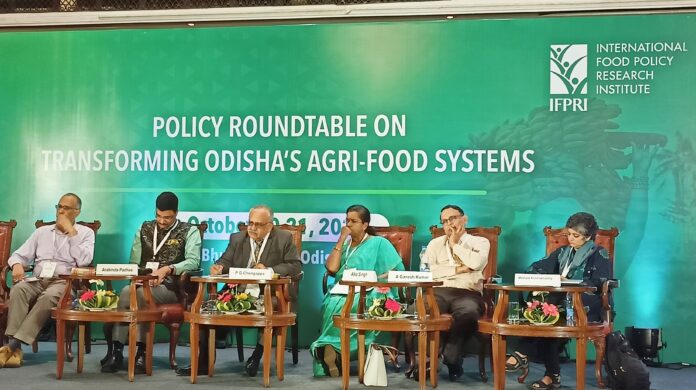Bhubaneshwar : Raising farmers’ incomes has been at the forefront of the national policy agenda since the last few years. The doubling farmers’ incomes (DFI) initiative of the Government of Odisha is an ambitious step towards this goal. A majority of farmers in Odisha, like in other parts of India, are smallholders. The challenges faced by these farmers have been exacerbated in the last few decades due to climate change which has resulted in an increased intensity as well as frequency of adverse weather events. There have been several steps taken by the Government of Odisha in the past to overcome these challenges and sustainably enhance the livelihoods of farmers. Further there is a need to enhance the coordination of the efforts from various government departments, partners, and other stakeholders for further improvement in outcomes for the farmers.
In this regard, the Government of Odisha (GoO) signed a memorandum of understanding (MoU) with the International Food Policy Research Institute (IFPRI) in May of this year. The MoU is aimed at facilitating long-term collaboration between IFPRI and the GoO to generate the evidence needed for policy formulation and effective implementation of programs to increase farmers’ incomes and improve the welfare of rural households in the state. The partnership also endeavors to develop a network of key stakeholders, including policymakers, private sector institutions, and civil society organizations in prioritizing challenges and possible approaches to enable faster diffusion of sustainable technologies, practices, and innovative policies for smallholders’ welfare.
Building on the MoU, the Department of Agriculture and Farmers’ Empowerment (DoAFE) in collaboration with IFPRI organized a high-level policy roundtable in Bhubaneswar, Odisha on October 20 and 21, 2022 on issues related to building a resilient food system in the state to improve farmers’ incomes. The roundtable brought together nearly 100 state officials, experts, and representatives from government bodies, technical support organizations, donors, international and local NGOs, multilateral agencies, and civil society organizations who are working to support the GoO’s efforts on DFI. The two-day dialogue featured sessions on developing sustainable and resilient agriculture and market systems, water and energy policies for food system transformation, and strategies for future cooperation. An important aspect of the discussions was to identify and optimize the various ongoing lines of work by the different institutions and actors, and to prevent an overlap of efforts.
Dr. Arabinda K. Padhee, Principal Secretary, DoAFE, noted that the policy roundtable “served as a suitable platform to brainstorm and deliberate on various strategies that aims to bring agri-food transformation in the state to sustainably raise farmers’ incomes. It also provided a great opportunity to discuss ways to measure the impacts of various steps taken by the government and other partners.” Several stakeholders such as the Bill & Melinda Gates Foundation (BMGF), International Rice Research Institute (IRRI), International Center for Agricultural Research in the Dry Areas (ICARDA), International Crops Research Institute for the Semi-Arid Tropics (ICRISAT), World Food Programme (WFP), International Potato Center (CIP), Odisha Integrated Irrigated Program for Climate Resilient Agriculture (OIIPCRA), Indian Council of Agricultural Research-National Rice Research Institute (ICAR-NRRI), ICAR-Central Institute of Brackishwater Aquaculture (ICAR-CIBA), ICAR-Central Institute for Women in Agriculture (ICAR-CIWA), International Water Management Institute (IWMI), Marine Products Export Development Authority (MPEDA), Oil Palm Companies, World Bank – Governance, Development and Impact (GDI) and others are working to towards the shared goal of improving farmers’ incomes in the state. It is not only important to achieve convergence in efforts of these organizations but also to re-calibrate various approaches for strengthening collaboration.
In recent years, the GoO has implemented many innovative programs that aimed to increase farmers’ incomes and support farm laborers, and poor families in rural areas. Given IFPRI’s experience in conducting such impact evaluations across different parts of the world, this collaboration with IFPRI will be useful to conduct similar rigorous evaluation of these programs in Odisha’s agriculture and food sector. IFPRI will also help in assessing and documenting the innovations and the achievements of these programs in the state to draw practical lessons from other states of India and countries in Asia and Africa. Dr. Shahidur Rashid, Director-South Asia, IFPRI remarked, “Through this high-level policy roundtable, IFPRI has tried to bring a convergence to the efforts of all the partners in the public and private sector, NGOs, and other stakeholders who are working to promote farmers’ welfare in Odisha, the exchange of information and experience has helped to highlight various linkages in our programs and opened up possibilities of future collaboration to realize the vision of the Government of Odisha.”
Hon’ble Minister for Agriculture & Farmers’ Empowerment and Fisheries & ARD, Government of Odisha, Shri Ranendra Pratap Swain, who inaugurated the event, said, “The roundtable serves as a welcome step as we embark on the path to achieve our ambitious goal of doubling farmers’ incomes. I am extremely confident that this roundtable will go a long way in bringing synergies to the efforts of all the organizations who are present here and working towards the betterment of Odisha’s rural economy.”For more information, please contact: Ms. Anisha Mohan, Communications Associate, IFPRI-South Asia at a.mohan@cgiar.org.

